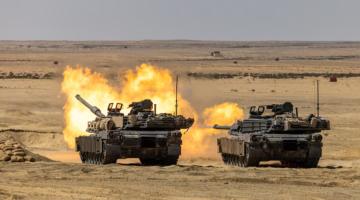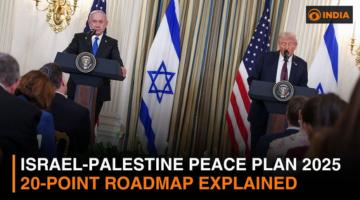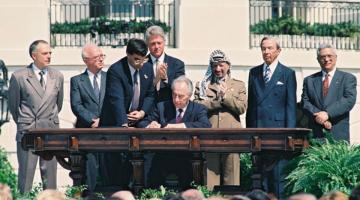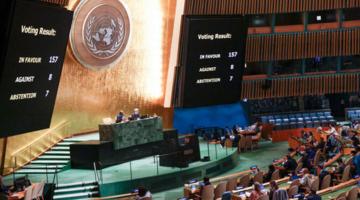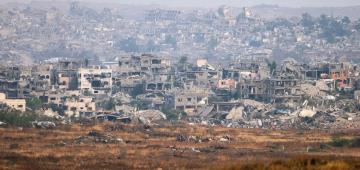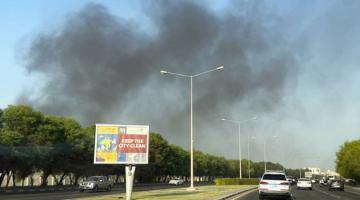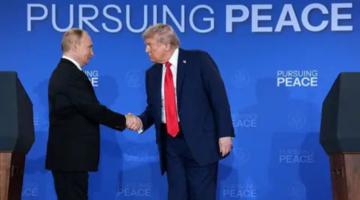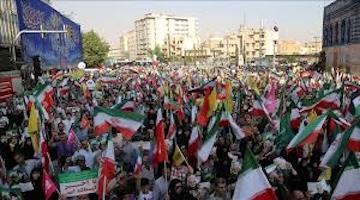The Axis of Resistance is shining a light on the reactionary regimes in the region who remain active and willing agents of imperialism.
Before the Al-Aqsa Flood operation on October 7th, developments in southwestern Asia were progressing in a reactionary fashion, with a number of Arab states normalizing relations with the zionist entity, including Saudi Arabia, whose actions were more furtive. For example, in July 2022, Saudi Arabia began allowing the zionist entity’s airplanes to use Saudi airspace, something the Biden White House called a “historic decision.” Yet, the resistance in Gaza has unleashed a progression of history that has unexpectedly shifted the fragile dynamics of a region entangled in Western imperialism. Further, despite an extremely heavy price of more than 35,000 Palestinian civilians killed by the zionist entity and greenlit by the imperialist triad (Japan, Europe, and North America), Al-Aqsa Flood has exposed who truly stands on the right side of history and who sides with barbarism. It has shown who acts collectively to define national liberation and who acts through the diktats of imperialism and its modus operandi.
Given the colossal failure of the zionist entity’s campaign in ‘freeing’ the prisoners held by the resistance in Gaza, in recent weeks, it sought ways to legitimize its military actions and demand for increased support from its imperialist allies. It did so by attempting to expand the war zone into neighboring countries to draw its allies into the orbit of war. The zionist entity began sporadically bombing Lebanon outside of the conflict area (attacking Beirut) and destroying civilian infrastructure in Syria and, most recently, escalated by bombing Iran’s consulate in Damascus. Now, the zionist entity, which has become a pariah entity (a term only used by mouthpieces of the Empire to describe Third World regimes that contest US hegemony, such as Libya pre-2011, Nicaragua, Democratic People’s Republic of Korea, and Iraq), has violated the Geneva Convention and the Vienna Convention by committing genocide and bombing a country’s consulate, and assassinating seven Iranian military advisers, including three seniors commanders.
Such a violation saw a noticeable retaliation by Iran and the Axis of Resistance. Following the heroic acts by Yemen to block all ships crossing through Bab Al-Mandab that are affiliated with the zionist entity, Iran began by first seizing a ship passing through the Strait of Hormuz. Second, Iran and the Axis of Resistance sent a barrage of drones, missiles, and rockets on the occupied Palestinian lands. While ahistorical, liberal narratives would reduce each action to their efficacy on the ground. But these actions by the Axis of Resistance have made colossal changes in the trajectory of history in the region in several ways. First, before the 7th of October, no one would think that anyone would dare bomb the zionist entity. Second, it shows that the impunity the zionist entity has enjoyed since its inception – it has constantly bombed Syria, and aided and armed the Islamic State and the separatist Kurds in Iraq through Mossad agents is now being challenged, such that, for the first time is experiencing limits to its belligerence. Third, though many frame Iran’s barrage as fruitless theatrics and expressions of prowess without having any, one must recognize that military strategy, not to be confused with tactical wins, are long-term objectives. Iran has probed the zionist entity and masterminded a strategy that granted it an accumulation of knowledge about the air defense systems in the region, which countries house operable imperialist airbases, and which regimes heed to imperialism.
The Role of the Functionaries of Imperialism
In 2002, Benjamin Netanyahu testified in US Congress and was asked if the US should launch preemptive attacks on any nation. He answered: “Are there other nations developing nuclear weapons? Yes. … Let me say what they are… The two nations that are vying and competing with each other who will be first to achieve nuclear weapons, ...[are] Iraq and Iran. And Iran is also outpacing Iraq in developing ballistic missile systems… A third nation, by the way, is Libya as well. Libya, while no one is watching, under the cloak, is trying very rapidly to build an atomic bomb capability. So, you have here now three nations.”
The only nuclear power in the ‘Middle East’ has often sought ways to maintain such a monopoly in the region as a deterrence strategy. Any other nation that sought to develop such a deterrence was often framed by the Zionist entity as a terrorist and a cause of concern for global peace and nuclear safety. The interest in monopolizing such a weapon is clearly articulated by Netanyahu as he tells the US which regimes ought to be overthrown in the region (namely, Iran, Iraq, and Libya) to maintain hegemony. The NATO-led regime change in Libya in 2011 and the “Coalition of the Willing” that destroyed Iraq in 2003 are a realization of the long-term plans of the Zionist entity to dismantle and destroy nations that oppose the hegemony of the US in the region. However, historical developments from the 1980s in Lebanon, Iran’s support to militants in Iraq after the US invasion, Syria’s determination for territorial integrity against the imperialist onslaught, and Yemen’s resistance against the Saudi-led coalition since 2015 have formed the crux of a force in the region that is obstinately opposing imperialism.
Unfortunately, many people on the so-called Left have an idealized version of what anti-imperialist resistance looks like. Anti-imperialist resistance today is not manifested in people carrying the rifle in one hand, and the writings of Mao, Lenin, and Marx in the other. Walter Rodney warns against such simplistic understanding by analysts, such that he wrote:
He (the analyst) is not merely transferring known truths from another part of the world to the African or Asian situations; he has to engage in the very difficult task of building from the bottom, an actual body of Marxist inquiry and Marxist analysis of the societies in question… Because, if you proceed into a situation, whether it be an analysis of Afro-America or an analysis of Pakistan, and you do not attempt to develop with respect to those specific situations, but rather merely to transfer a body of knowledge in a fixed static form from another part of the world, then you will be accused of being irrelevant. You will be accused of cultural hegemony; you will be accused of trying to force the indigenous interpretation into your own external imperialist-oriented model.
In simpler terms, it is imperative to not import ideas and analyses from one context and ahistorically apply them to another; the more astute approach is to contextualize and ground the analysis in culture, politics, economics, and history. The resistance in the 21st century looks different from previous forms of resistance because of how it was birthed, how it was supported, and the ideologies it espouses.
Since the beginning of the millennium, a war of various kinds has been launched on the Axis of Resistance: economic warfare on Lebanon to disempower Hezbollah, sanctions on Iran to de-industrialize it and create a larger distaste of the government coupled with attempts of color revolution to overthrow Iran’s government, militarily arming of terrorist factions and providing them with intelligence to destabilize in Syria (Jake Sullivan once told Hillary Clinton that “Al-Qaida is on our side in Syria” while militarily occupying Syria’s northeast oil-rich region.) The Axis of Resistance is facing such extraordinary pressure from imperialism and therefore is creating a united front to combat it.
One crucial lesson learned from the Al-Aqsa Flood operation is that imperialism is alive and well, and for imperialism to survive it needs to rely not only on dominating militarily and economically but also on replacing the popular desires of peoples in the global south with regimes that are functionaries of imperialism. The term functionary here is crucial to delimit. If the Zionist entity desires to kill a nation, as it did to Iraq and Libya, demanding the destruction and supporting imperialist interventions under the guise of promoting democracy makes one a functionary of imperialism. If one does not oppose the Zionist bombing of Syria, supports sanctions on Lebanon, Yemen, Iran (and many others), and calls for a regime change in these contexts, then one is a functionary of imperialism. While there are endless State Department intellectuals who unequivocally produce literature that legitimizes imperialist interventions (again, imperialism is economic and military) are individual functionaries of imperialism, Iran and the Axis of Resistance have shown which regimes are the true functionaries of imperialism. There is Egypt that cannot challenge the Camp David agreement and open the Rafah border to allow aid; the Saudis who, through the use of US equipment, are blocking Yemen’s missiles; Jordan was praised by the Zionist regime for cooperating in obstructing the barrage; all the Gulf countries that house US military bases that participated in intercepting Iran’s barrage are all functionaries of imperialism. None of these countries used their military power to stop the genocide and/or end the manufactured collective starvation in Gaza. Instead, they put all of their military power into attempting to minimize the impact of Iran’s barrage on the Zionist entity.
The Axis of Resistance has taught us a lesson that these reactionary regimes are not mere puppets who simply follow the orders of the US-led imperialism, but that their actions, which some argue are done with complete agency, have never stood against imperialism; they have, in fact, enabled it. The Axis of Resistance is exposing imperialism’s functionaries in the region, but also the necessity to battle against them.
Essam Elkorghli is a Libyan PhD student at the University of Illinois at Urbana-Champaign. He researches Libya’s modern political history and contemporary imperialism in education. He is a labor organizer with the Graduate Employees’ Organization, assistant editor for Middle East Critique Journal, and a member of the Global Pan African Movement.

